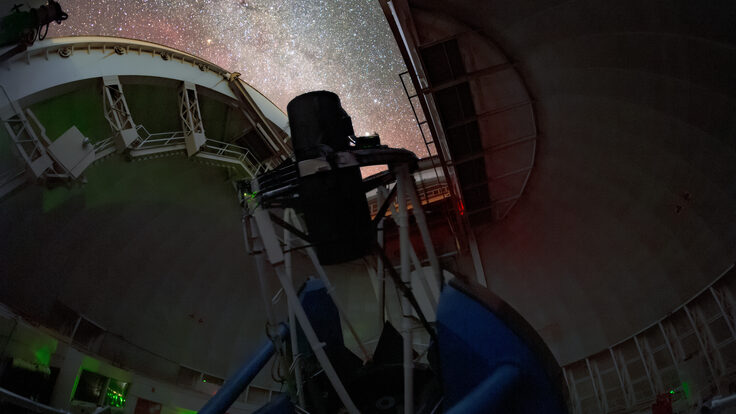Picture this: The abandoned underground tunnels for what would have been the world’s largest particle accelerator get taken over by a billionaire/physicist duo that plans to recreate the Big Bang and bring about the end of the world as we know it.
Sound like great movie fodder? Director Tony Krantz certainly thought so. It’s the basis of his new movie, The Big Bang, a neo-noir thriller which comes out in theatres today (view the trailer online. Caution: Not safe for work).
According to the movie synopsis, a Los Angeles private eye (Antonio Banderas) is on a hunt to find a Russian boxer’s stripper ex-girlfriend. Along the way he meets some interesting characters, including a particle physics-obsessed waitress, played by Autumn Reeser, and the folks who are intent on destroying the world. It all sounds very complicated.
Now don’t you worry, all you physicists and folks out there who appreciate good science. I see you scratching your head with a confused look on your face. And understandably so, as the particle physics scenario put forth in this movie is not feasible at all.
But is that really a bad thing?
“Well, obviously it’s not sound science,” said Jennifer Ouellette, science writer and former director of the Science & Entertainment Exchange. “People hear ‘recreate the Big Bang’ and they think ‘Explosion!’ and that’s actually a function of them not really understanding what the Big Bang was, that it happens at very tiny, small sub-atomic scales.”
Although she hasn’t seen the movie yet, she had a thing or two to say about the issue of mangled science in films. While serving on the Science & Entertainment Exchange, she worked to bring more accurate science to Hollywood.
You have to bear in mind that the story is first and foremost, and “any science that’s in there has to be in service to the story,” she said.
This means you can’t expect Hollywood directors to jump at the chance to provide detailed explanations for the scientific concepts put forth in the movie.
But neither can you expect them to refrain from embellishing the science, even to the point of it being completely wrong, completely… fictional (that’s why it’s called science fiction).
Some scientists fall off the rocker when they see bad science on the big screen. But Ouellette thinks we need not respond this way.
“You can sit there and shake your finger and cluck your tongue and say this is really bad for science,” she said. “Or you can say, ‘This gives us a great opportunity, we can write blog posts, we can give talks, we can show clips in our classrooms from this movie and get a good laugh and talk about why that’s not so.’”
Fanciful science found in movies can also inspire young children to explore the wonders of science as they grow up, which can lead to future scientific advances, Ouellette said.
“Science inspires sci-fi writers and movie makers, and they in turn write these futuristic, creative takes,” she explained. “Then budding young scientists see those and grow up and want to invent those devices. It’s a very nice symbiotic relationship when it works.”
Okay, but couldn’t that be accomplished by using true science? I mean, there are people out there that will walk away from this movie thinking that high-energy particle physicists are out to destroy the world.
“The bottom line is that what [movie makers] ultimately are going to care about, and what audiences care about is characters and emotional resonance and good story,” Ouellette said.
And while, yes, it would great if the science presented in movies were at least somewhat accurate (or at least didn’t make us cringe), “good science is not why we go to the movies,” she added.
Good point.
So if you’re looking for a movie that accurately portrays what high-energy particle colliders can accomplish for society, you’re going to want to pass on this one.
But if you’re looking for a neo-noir racy sci-fi thriller with some fanciful particle physics ideas mixed in, (which could lead to nerdy science talk amongst friends), then it may be worth your while!
See what others have to say about the movie here.







